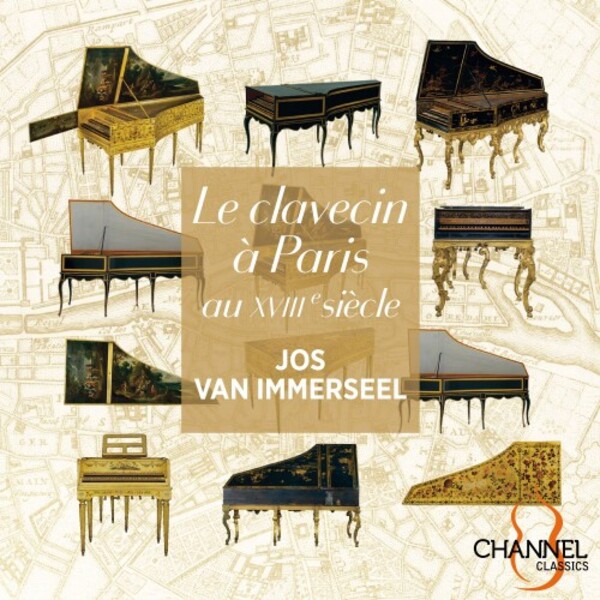Le clavecin à Paris au XVIIIe siècle (Jos van Immerseel)
View record and artist detailsRecord and Artist Details
Genre:
Instrumental
Label: Channel Classics
Magazine Review Date: 01/2024
Media Format: CD or Download
Media Runtime: 163
Mastering:
DDD
Catalogue Number: CCS45523

Tracks:
| Composition | Artist Credit |
|---|---|
| Pièces de clavecin, Movement: Livre premier |
Louis Marchand, Composer
Jos van Immerseel, Piano |
| Livres de clavecin, Book 1, Movement: Premier Ordre (G minor-major) |
François Couperin, Composer
Jos van Immerseel, Piano |
| Livres de clavecin, Book 1, Movement: Troisième Ordre (C minor-major) |
François Couperin, Composer
Jos van Immerseel, Piano |
| Nouvelle Suite de Pièces de Clavecin, Movement: Suite in A minor/major |
Jean-Philippe Rameau, Composer
Jos van Immerseel, Piano |
| Nouvelle Suite de Pièces de Clavecin, Movement: Suite in G major/minor |
Jean-Philippe Rameau, Composer
Jos van Immerseel, Piano |
| Pièces de viole, Movement: Suite No 1 |
Antoine Forqueray, Composer
Jos van Immerseel, Piano |
| Pièces de viole, Movement: Suite No 5 |
Antoine Forqueray, Composer
Jos van Immerseel, Piano |
| Troisième livre de pièces de clavecin, Movement: La De Belombre |
Jacques Duphly, Composer
Jos van Immerseel, Piano |
| La Forqueray |
Jacques Duphly, Composer
Jos van Immerseel, Piano |
| Premier livre de pièces de clavecin (et al), Movement: Chaconne |
Jacques Duphly, Composer
Jos van Immerseel, Piano |
| Premier livre de pièces de clavecin (et al), Movement: Rondeau |
Jacques Duphly, Composer
Jos van Immerseel, Piano |
| Premier livre de pièces de clavecin (et al), Movement: La de Drummond |
Jacques Duphly, Composer
Jos van Immerseel, Piano |
| Premier livre de pièces de clavecin, Movement: La de Caze |
Claude-Béninge Balbastre, Composer
Jos van Immerseel, Piano |
| Premier livre de pièces de clavecin, Movement: La Lugeac |
Claude-Béninge Balbastre, Composer
Jos van Immerseel, Piano |
| Premier livre de pièces de clavecin, Movement: La d'Héricourt |
Claude-Béninge Balbastre, Composer
Jos van Immerseel, Piano |
| Premier livre de pièces de clavecin, Movement: La Malesherbe |
Claude-Béninge Balbastre, Composer
Jos van Immerseel, Piano |
| Air Gay |
Claude-Béninge Balbastre, Composer
Jos van Immerseel, Piano |
| (L') Arlequine |
Armand-Louis Couperin, Composer
Jos van Immerseel, Piano |
| Pièces de Clavecin, Movement: L'Affligée |
Armand-Louis Couperin, Composer
Jos van Immerseel, Piano |
Author: Lindsay Kemp
For most readers, Jos van Immerseel will be associated primarily with historical pianos, on which he has over the years produced a sizeable catalogue of recordings, from Mozart and Beethoven right up to Debussy and Rachmaninov. Yet he studied as a harpsichordist, won the Paris Competition in 1973, and made most of his earliest recordings on it. Here he returns to it to showcase not just his own adroitness in the great 18th-century French harpsichord tradition, but also three original instruments from the collection of the Musée de la Musique at the Philharmonie in Paris. The booklet-note descriptions of these venerable survivors are strictly technical, so let me tell you of their beauties: the 1761 Hemsch used for Marchand and François Couperin has a crisp-cut brightness fortified by a singing, resonant bass; the 1646 Ruckers (rebuilt by Taskin in 1780) speaks with a tangier and narrower tone, though again a big bass register, seeming at times almost like a different instrument, gives it the heft and authority for Rameau and the low-lying gamba transcriptions of Forqueray; and a 1749 Goujon projects a harder, almost trumpety sound to suit the more orchestrally orientated works of Duphly, Balbastre and Armand-Louis Couperin.
Immerseel’s way with the music is calm and measured; some of the faster pieces, and especially extrovert ones such as Rameau’s Les Sauvages or Forqueray’s ‘Jupiter’, seem to lack their normal excitement, while others simply sound sluggish – Balbastre in particular seems to have awoken no joy in the player. But then, at least with no one getting carried away, everything stays coherent and the instruments can speak. And in any case there are places where Immerseel finds a distinctive character in the music: in Forqueray’s ‘La Laborde’ he crafts an effective harpsichord equivalent to the noble sound world of the viola da gamba; the same composer’s ‘La Bellmont’ has a demonic undertone; Armand-Louis Couperin’s ‘L’Arlequine’ is a scamp; and Rameau’s ‘L’Enharmonique’ combines skipping, Scarlatti ish keyboard energy with a contemplative air while still maintaining a coherent line through the chromatic meanderings. Some ornaments are a little pinched and there seems to be a missing note in Duphly’s ‘La De Drummond’, but Immerseel’s gentle hand on the instrument releases the full depth and grandeur of the sturdy chaconnes of Marchand and François Couperin and Forqueray’s ‘La Rameau’, and his command of French harpsichord style is completely convincing, even if he does not play with the looser flow of a Jean Rondeau, say. On the whole, though, this programme is a good introduction to a glorious century of French harpsichord music, a tribute not just to Immerseel and his seven composers but also to the makers and restorers of these magisterial instruments.
Discover the world's largest classical music catalogue with Presto Music.

Gramophone Digital Club
- Digital Edition
- Digital Archive
- Reviews Database
- Full website access
From £8.75 / month
Subscribe
Gramophone Full Club
- Print Edition
- Digital Edition
- Digital Archive
- Reviews Database
- Full website access
From £11.00 / month
Subscribe
If you are a library, university or other organisation that would be interested in an institutional subscription to Gramophone please click here for further information.




